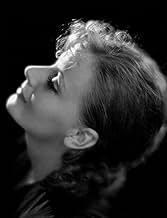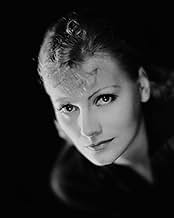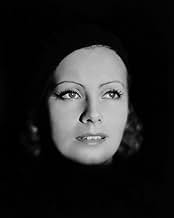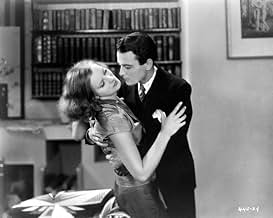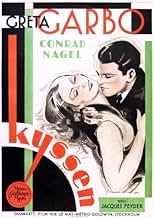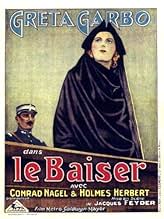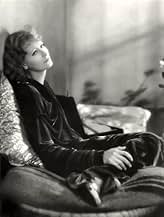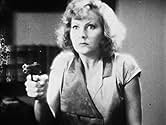AVALIAÇÃO DA IMDb
6,8/10
1,3 mil
SUA AVALIAÇÃO
Adicionar um enredo no seu idiomaAn unhappily married woman is caught up in scandal and murder when her affection toward a young man is misinterpreted.An unhappily married woman is caught up in scandal and murder when her affection toward a young man is misinterpreted.An unhappily married woman is caught up in scandal and murder when her affection toward a young man is misinterpreted.
- Direção
- Roteiristas
- Artistas
Symona Boniface
- Gossip in Museum
- (não creditado)
Allan Cavan
- Prison Warden
- (não creditado)
André Cheron
- Prosecutor
- (não creditado)
Carrie Daumery
- Party Guest
- (não creditado)
Ruth Feldman
- Scrubwoman
- (não creditado)
Lee Phelps
- Tour Guide
- (não creditado)
Philip Sleeman
- Lounge Lizard
- (não creditado)
- Direção
- Roteiristas
- Elenco e equipe completos
- Produção, bilheteria e muito mais no IMDbPro
Avaliações em destaque
"The kiss" took the melodramatic accents of Feyder 's precedent work " Les Nouveaux Messieurs"and tightened them up;whereas that work should have been boiled down to a 90 min movie, "the kiss" depicts a tragedy in admirably succinct style :only 62 min,a very good screenplay which does not reveal the whole truth before the last minutes.It's the classic story of the divine lady married with a graybeard without love ,in love with a more handsome gent;add a young man,pretending to be a man (the subject of the immature young lad will come back later in Feyder 's career in " Pension Mimosas")and all the ingredients of a good melodrama are in it.
In Hollywood,Feyder accurately depicted his native land:in jails for women ,the wardens were nuns (in 1960 ,in Clouzot's "La Vérité" ,Brigitte Bardot was guarded by sisters too);and the gendarmes' uniforms are exactly as they were.
After this successful work (which owed a lot to G.Garbo in her last silent movie) ,Feyder was disappointed with the screenplays left for him to direct and he came back to his native land and produced his greatest achievements :"Le Grand Jeu" ,"Pension Mimosas" and his masterpiece "La Kermesse Héroique".
In Hollywood,Feyder accurately depicted his native land:in jails for women ,the wardens were nuns (in 1960 ,in Clouzot's "La Vérité" ,Brigitte Bardot was guarded by sisters too);and the gendarmes' uniforms are exactly as they were.
After this successful work (which owed a lot to G.Garbo in her last silent movie) ,Feyder was disappointed with the screenplays left for him to direct and he came back to his native land and produced his greatest achievements :"Le Grand Jeu" ,"Pension Mimosas" and his masterpiece "La Kermesse Héroique".
I've got to admit up front that I have long felt that Greta Garbo was a bit overrated as an actress. All too often, she was stuck in super-melodramatic films involving either adultery or with Garbo playing an irresistible "super-vamp". While the public loved this persona, the films seemed quite derivative and clichéd. There are only so many films like this you can watch until they blend together.
Fortunately, she also made some dandy films like NINOTCHKA, QUEEN Christina and THE KISS. While superficially the film seems just like another adultery film, Garbo was given better material--as she was a woman who WANTED to commit adultery but couldn't bring herself to cheat on her much older husband. I'm glad the film didn't pursue this expected plot line but instead the film is about the consequences when the husband THINKS she's cheating on him when she isn't. This led to a dandy finale where there is a nice plot twist.
Overall, this film excelled because Garbo did NOT stare in a pained way into space as she so often did in films where she played a married woman trapped in a loveless marriage. Here, she plays a more believable and well-rounded personality--someone who seemed much more human than the usual Garbo character.
With good production values and only one minor problem (a repetitive and sappy soundtrack), this is well worth a look.
Fortunately, she also made some dandy films like NINOTCHKA, QUEEN Christina and THE KISS. While superficially the film seems just like another adultery film, Garbo was given better material--as she was a woman who WANTED to commit adultery but couldn't bring herself to cheat on her much older husband. I'm glad the film didn't pursue this expected plot line but instead the film is about the consequences when the husband THINKS she's cheating on him when she isn't. This led to a dandy finale where there is a nice plot twist.
Overall, this film excelled because Garbo did NOT stare in a pained way into space as she so often did in films where she played a married woman trapped in a loveless marriage. Here, she plays a more believable and well-rounded personality--someone who seemed much more human than the usual Garbo character.
With good production values and only one minor problem (a repetitive and sappy soundtrack), this is well worth a look.
Greta Garbo's last silent film finds her unhappily married to Andres Randalf, tearfully fending off the advances of old boyfriend Conrad Nagel and letting young and callow Lew Ayres steal A Kiss from her. Ayres is the son of Holmes Herbert who is her husband's business partner complicating things even more.
You can't blame Ayres though. In that last silent film Garbo is certainly at her most alluring and she carries the film off beautifully.
Ayres is thinking with his male member and he's at an age where there is more tendency to do that. When Randalf catches him with Garbo he starts beating on the kid as any jealous husband would. He gets shot for his troubles and Garbo is arrested. She also shields young Ayres telling him to leave the premises.
This is where Nagel comes in. Even without dialog as per usual in a courtroom scene he does well in putting over the dramatic impact of the trial. All actors love courtroom drama and Nagel gets some good innings in here.
I have to say though, French forensics leave a lot to be desired if they are manipulated in the way they are.
In the hands of a lesser actress The Kiss would have been melodramatic claptrap. But Garbo can make anything look positively poetical.
You can't blame Ayres though. In that last silent film Garbo is certainly at her most alluring and she carries the film off beautifully.
Ayres is thinking with his male member and he's at an age where there is more tendency to do that. When Randalf catches him with Garbo he starts beating on the kid as any jealous husband would. He gets shot for his troubles and Garbo is arrested. She also shields young Ayres telling him to leave the premises.
This is where Nagel comes in. Even without dialog as per usual in a courtroom scene he does well in putting over the dramatic impact of the trial. All actors love courtroom drama and Nagel gets some good innings in here.
I have to say though, French forensics leave a lot to be desired if they are manipulated in the way they are.
In the hands of a lesser actress The Kiss would have been melodramatic claptrap. But Garbo can make anything look positively poetical.
"The Kiss" happens about midway into the movie ... Greta Garbo gives young admirer Lew Ayres a friendly kiss goodbye as he's about to leave town, Ayres, who cannot control his infatuation with the beautiful Garbo, goes in for another, less platonic kiss, at which point Garbo's husband sees them from afar and goes berserk. A fight amongst the three ensues, gets carried into another room where the door is shut to us, the audience, and we hear a shot. Garbo's husband is dead, but who did it?
Prior to the "kiss" moment, we've seen Garbo and her lover (Conrad Nagel) in a torturous romance ... they both love each other madly but Greta doesn't see any way out of her loveless marriage. In the meantime, Lew Ayres follows Greta around like a puppy dog; he's an 18-year-old completely infatuated with the beautiful married lady.
The latter half of the movie deals with the investigation of the husband's death, Greta's arrest, and her trial where she is defended by Nagel who in addition to being her former lover is also a lawyer.
I won't give away the outcome of the trial, but I will say that the jury believes it is Person A who did it and after the trial we learn it was Person B.
The musical score to this flick was absolutely horrible. I especially could have done without the "Romeo and Juliet" theme that was played every time the flick wanted to telegraph Greta's and Conrad's love to the audience.
Despite the score, this was a very enjoyable silent movie. I find some silents tedious, others quite well done. "The Kiss" definitely falls into the latter category. Worth watching.
Prior to the "kiss" moment, we've seen Garbo and her lover (Conrad Nagel) in a torturous romance ... they both love each other madly but Greta doesn't see any way out of her loveless marriage. In the meantime, Lew Ayres follows Greta around like a puppy dog; he's an 18-year-old completely infatuated with the beautiful married lady.
The latter half of the movie deals with the investigation of the husband's death, Greta's arrest, and her trial where she is defended by Nagel who in addition to being her former lover is also a lawyer.
I won't give away the outcome of the trial, but I will say that the jury believes it is Person A who did it and after the trial we learn it was Person B.
The musical score to this flick was absolutely horrible. I especially could have done without the "Romeo and Juliet" theme that was played every time the flick wanted to telegraph Greta's and Conrad's love to the audience.
Despite the score, this was a very enjoyable silent movie. I find some silents tedious, others quite well done. "The Kiss" definitely falls into the latter category. Worth watching.
In star Greta Garbo's silent films especially, I think the stories are secondary to the images. They tend to be similarly melodramatic romances about adultery and love triangles and the surrounding scandals and tragedies. This one is more of a love rectangle, with Garbo's husband and the characters played by Conrad Nagel and Lew Ayres all trying to possess her. It's a generic formula, especially for the vehicles of MGM's star Garbo. Yes, there's a mystery element, but that's none too appealing, either. There's even dinner-party and courtroom scenes, and, of course, her husband is an old rotund businessman. The title cards are gushy, and the musical score, including the love theme from Tchaikovsky's "Romeo and Juliet," is unoriginal. Yet, the narrative does focus in some interesting and different ways on Garbo's image, and this is yet another lovely-looking late silent film, as Garbo's 1920s MGM productions tend to be. It's fortunate that Garbo, with her foreign accent, was the last of the studio's stars to transition to talkies--this being the last silent film of both Garbo and MGM--because they're some of the most deliberately gorgeous pictures of the era. They're far superior to the awkward early talkies concurrently being made by others.
Appropriately, "The Kiss" begins with Garbo and one of her lovers in a French art gallery; from there, the film itself is a piece of visual art. Much of that is the glossy close-ups of Garbo's face, but there's an emphasis on shots of her walking and riding away from men in this one, too. There are several overhead establishing shots, superimposed images and dolly-shot transitions. The best moving camera shot is in the assault scene, with the camera pulling back after the door closes. The gunshot and phone ringing are also a better use of sound effects than in most contemporary talkies. There are two flashback scenes of this incident as narrated, or imagined, by Garbo--one is a lie and the other, presumably, is the truth. Both are filmed differently and from different angles than the first instance. The Art Deco sets are impressive, too--mainly for Garbo's home. The abstract skyscrapers design on her bedroom wall is a standout. Additionally, there's the motif of Garbo's image: Ayres wants a photograph of her, the newspapers print her image, the courtroom artists draw it, while the overall film and machinery of MGM's star making focuses on creating it. In this case, that machinery is partly of European imported artists, including Garbo herself, the director and the writer. The transition to talkies would surrender much of such foreign talent, although, fortunately, not Garbo.
With about an hour runtime, this is a relatively-brief feature and taut. For instance, when the husband has his wife tailed, it's to establish his jealous suspicions, which are sure to foreshadow later events. And when we're shown "Chekhov's gun," expect it to be fired by the end.
Appropriately, "The Kiss" begins with Garbo and one of her lovers in a French art gallery; from there, the film itself is a piece of visual art. Much of that is the glossy close-ups of Garbo's face, but there's an emphasis on shots of her walking and riding away from men in this one, too. There are several overhead establishing shots, superimposed images and dolly-shot transitions. The best moving camera shot is in the assault scene, with the camera pulling back after the door closes. The gunshot and phone ringing are also a better use of sound effects than in most contemporary talkies. There are two flashback scenes of this incident as narrated, or imagined, by Garbo--one is a lie and the other, presumably, is the truth. Both are filmed differently and from different angles than the first instance. The Art Deco sets are impressive, too--mainly for Garbo's home. The abstract skyscrapers design on her bedroom wall is a standout. Additionally, there's the motif of Garbo's image: Ayres wants a photograph of her, the newspapers print her image, the courtroom artists draw it, while the overall film and machinery of MGM's star making focuses on creating it. In this case, that machinery is partly of European imported artists, including Garbo herself, the director and the writer. The transition to talkies would surrender much of such foreign talent, although, fortunately, not Garbo.
With about an hour runtime, this is a relatively-brief feature and taut. For instance, when the husband has his wife tailed, it's to establish his jealous suspicions, which are sure to foreshadow later events. And when we're shown "Chekhov's gun," expect it to be fired by the end.
Você sabia?
- CuriosidadesMGM's last non-talking picture.
- Erros de gravaçãoIn the opening credits, the name André, Conrad Nagel's character, is spelled "Ardré."
- Versões alternativasMGM also released this movie without a soundtrack, as a totally silent film.
- ConexõesFeatured in MGM Parade: Episode #1.30 (1956)
Principais escolhas
Faça login para avaliar e ver a lista de recomendações personalizadas
- How long is The Kiss?Fornecido pela Alexa
Detalhes
Bilheteria
- Orçamento
- US$ 257.000 (estimativa)
- Tempo de duração
- 1 h 2 min(62 min)
- Mixagem de som
- Proporção
- 1.33 : 1
Contribua para esta página
Sugerir uma alteração ou adicionar conteúdo ausente

